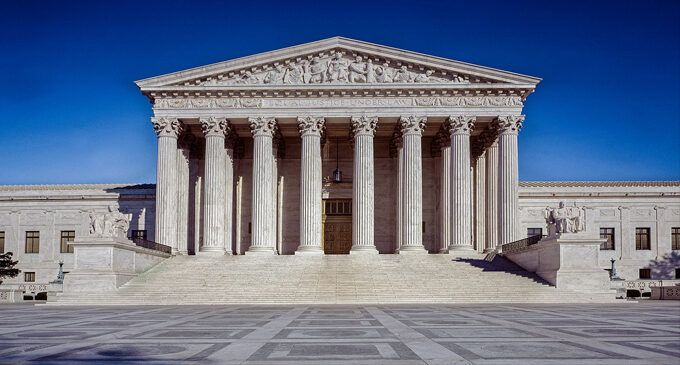Supreme Court denies religious freedom

By Bob Topper
A good friend who heads a leading law firm once explained that when a lawyer’s case is weak, he argues precedent. He relies on historical findings in similar cases to razzle-dazzle the judge and jury. But when a lawyer is in command of his case, understands how and why his position is fair and just, he doesn’t sway the court with arcane case law. He presents the facts logically, in plain language, so that everyone, including the opposing attorney, will see and agree that the verdict he seeks is fair and just.
As I read Justice Alito’s decision on Dobbs v. Jackson Women’s Health Organization, my friend’s explanation came to mind. Why would anyone need 65 pages citing law back to the 1600s to explain that Roe and Casey were “egregiously wrong from the start.” Something so “conspicuously bad” should have been obvious to everyone.
But Alito’s case is weak, and so his decision is an obfuscation. It is a legalistic tap dance justifying subjective personal belief in the face of the rational decisions of Roe v. Wade and Planned Parenthood v. Casey. What is more, his argument denies religious freedom to non-Christians.
Christians believe that men and women have a body, and a soul. The soul makes humans uniquely different from other animals. Many Christians claim a third division – between the soul and spirit. And Christians debate when the soul-spirit enters the body. Some say at birth, some at conception, some at quickening or other gestation marker. But there is no factual evidence that a soul or spirit exists. And so, these religious debates have gone on for centuries and are unlikely ever to end. Without evidence, there can be no rational conclusion.
One of the things that made America great is that it didn’t take sides in this kind of debate. Until Roe was overturned, Americans had always been at liberty, free, to believe whatever they chose to believe. Our secular Constitution guaranteed this freedom of choice.
Humankind’s ability to reason is the foundation of our Republic. Reason is the basis of our laws and judicial system. When the founders wrote our Declaration of Independence and our Constitution, they were inspired. Their inspiration came from the Enlightenment philosophy of the 17th century, the Age of Reason, from people like Hobbs, Rosseau, Spinoza and Locke, who rejected Christian revelation as a foundation for government and law and replaced it with reason. Despite the founder’s faith in humankind’s reasoning ability, Alito takes the opposite view; he chooses Christian belief over reason.
Roe and Casey understood that laws banning abortion, like the Mississippi law at hand, are a violation of women’s rights. The Roe and Casey courts appreciated that any decision regarding when or if a fetus becomes a human life must be subjective. So only a woman can decide whether or not she should terminate her pregnancy. Neither the courts, nor the state nor anyone else had any right to interfere with that liberty.
Taking a different path, Alito decides that this woman’s liberty, her right to choose, must be “ordered,” which is to say restricted. Inherently, this says that women are lesser beings, incapable of self-determination and attempts to diminish them as equals.
Consider this arcane paragraph:
“Ordered liberty sets limits and defines the boundary between competing interests. Roe and Casey each struck a particular balance between the interests of a woman who wants an abortion and the interests of what they termed “potential life.” Roe, 410 U. S., at 150; Casey, 505 U. S., at 852. But the people of the various States may evaluate those interests differently. In some States, voters may believe that the abortion right should be even more extensive than the right that Roe and Casey recognized. Voters in other States may wish to impose tight restrictions based on their belief that abortion destroys an “unborn human being.” Miss. Code Ann. §41–41–191(4)(b). Our Nation’s historical understanding of ordered liberty does not prevent the people’s elected representatives from deciding how abortion should be regulated.”
The competing interests of Ordered Liberty are freedom and societal order. Fifty years have shown that the freedom Roe v. Wade insures has had no impact on societal “order.” Hence, with this “ordered liberty” argument, Alito takes us down a rabbit hole with no explanation of how Roe or his decision affects “ordered liberty.” More importantly, both Roe and Casey determined that a women’s right to choose is fundamental, the right of all women, everywhere. Such rights are not arbitrary, nor are they a matter of “ordered liberty” and so cannot be left to the states any more than the right to inter-racial marriage can be.
He asserts, “Voters in other states may wish to impose tight restrictions based on their belief.” Belief is the key word. Alito claims this fundamental right is arbitrary and does not depend on truth or fact but on what most people wish to believe. A lack of factual evidence is of no concern. Here he endorses Christian belief, for this is a Mississippi case, where 83% of voters are Christian, and this is what Christians believe.
So, the law that Alito defends requires everyone in Mississippi to abide by a Christian belief, which denies religious freedom to anyone who believes differently.
The separation of church and state applies to our Nation as a whole. In that context, one can see why his position is so terribly wrong. By his logic, the Christian majority in Mississippi could impose other restrictions, like outlawing non-Christian religions or requiring attendance at Christian Sunday services.
Moreover, this judgment jeopardizes other hard-won rights, including birth control, interracial marriage, gay marriage, and other LBGT rights. The irrational framework of Dobbs could just as well be applied to those cases, as Justice Thomas has already suggested should be done.
The founders were concerned that a “tyranny of the majority” would deny individual rights, as this Mississippi law has done. They added The Bill of Rights to our Constitution to protect against this very injustice. Majorities can’t impose subjective beliefs on the United States. Look at slavery. In 1865, the belief that slavery was acceptable was firmly and ultimately rejected; at the end of the Civil War, the Confederacy, including Mississippi, surrendered their state slavery laws.
Sure, some will believe that Alito’s argument is “fair and just,” but most Americans will instead apply those attributes to this compelling excerpt from Casey, in plain language that everyone can understand:
“Men and women of good conscience can disagree, and we suppose some always shall disagree, about the profound moral and spiritual implications of terminating a pregnancy, even in its earliest stage. Some of us as individuals find abortion offensive to our most basic principles of morality, but that cannot control our decision. Our obligation is to define the liberty of all, not to mandate our own moral code.”
Bob Topper is a retired engineer and is syndicated by PeaceVoice.









